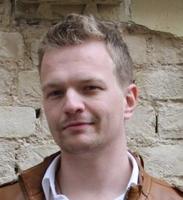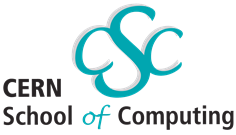CSC 2014 award for best marks
This year, 3 students have passed the exam with the maximum score of 33/33. This is a particlularly outsdanding result and please congratulate:
 ANDERLINI, Lucio - INFN e Universita, Firenze, Italy
ANDERLINI, Lucio - INFN e Universita, Firenze, Italy
I am a Ph.D. student in Physics at the University of Florence, Italy. As a member of the LHCb Collaboration I devoted most of my time to data analysis, with contributions in the characterization of the Bc meson. I spent one year at CERN where I played the role of interface between the computing production group and the b-physics analysis working group. Being a geek, I am used to push new computing technologies and ideas into our analysis code. I am an experienced C/C++ and python developer, and I am familiar with multi-core heterogeneous architectures. Recently, I have started playing with web technologies (JavaScript, PHP, CGI) to develop simple user interfaces for monitoring and validation tasks.
 NIEKE, Christian - CERN, Geneva, Switzerland
NIEKE, Christian - CERN, Geneva, Switzerland
I am currently working as a doctoral student at CERN Data Storage Services (IT-DSS) in cooperation with Technische Universität Braunschweig, and my thesis topic is: “Quantitative optimization of CERN’s large storage systems based on measured user access patterns”. In 2007 I graduated as Diplom-Ingenieur (BA) / B.Sc Information Technology from the University of Cooperative Education Mannheim, in cooperation with the German Aerospace Center [DLR]. I continued my studies at Technische Universität Braunschweig where I received my M.Sc. in Computer Science in 2010. I then worked until 2013 as a research assistant at Technische Universität Braunschweig, Department of Bioinformatics & Biochemistry on MetaboliteDetector, a tool for the analysis of GC/MS based metabolomics data, and a management system for experimental data. Afterwards, I worked for 7 months as a research assistant at the National Institute of Informatics (NII) in Tokyo, Japan, before coming to CERN.
 NIKODEM, Thomas - Physikalische Institut Heidelberg, Germany
NIKODEM, Thomas - Physikalische Institut Heidelberg, Germany
I am currently a PhD student in particle physics with the LHCb collaboration. For my work so far, I have contributed to a precision measurement of b hadron lifetimes which tests the Heavy Quark Expansion model of the b quark. At the moment, I am working on an angular measurement of the decay, B->K*mumu, to search for deviations from the standard model in b-s quark transitions. I am also involved in performance studies and improvements of the track reconstruction algorithms which will be used in the upgrade of the LHCb detector. The increasing data yield after the upgrade puts strict requirements on the algorithms, both in efficiency and also in timing, which are accomplished using the latest computing technology.
Special Distinction
This year a total of 7 students have received the CSC special distinction as they passed the exam with a particularly high score.
2 students passed the exam with a score of 32/33. Congratulations to:
 LIONETTO, Federica - University of Zuerich, Switzerland
LIONETTO, Federica - University of Zuerich, Switzerland
I hold a MSc degree in physics from University of Pisa (Italy). I specialized in high–energy physics, graduating with top marks in July. While at university, I had the opportunity to spend several months abroad, working as a summer student first for the CDF experiment at FNAL, in the US, where I participated in the data analysis activities on rare Bs0 meson decays, and then for the NA62 experiment at CERN, where I was involved in a project aiming at demonstrating that parallel computing can be used at trigger level in high–energy physics experiments. I further developed my interests in both heavy–flavor physics and trigger systems while working as a technical student for the LHCb experiment at LHC, where I investigated how to improve the online selection of hadronic heavy–flavor decays. I also devoted a part of my free time to outreach, working for INFN, CERN, and the municipality of Pisa. I am now a PhD student of the University of Zurich (Switzerland) and I am working for the LHCb experiment, focusing on R&D activities on silicon mi- crostrip sensors in view of the upgrade of the tracking system. I am characteris- ing the performances, in terms of charge sharing and charge collection efficiency, of sensors with different geometries. Inefficiency in the charge collection has been observed in a previous measurement on current sensors and may be non- negligible for the new ones, so a detailed study is necessary before the design of the sensors is finalised. As a part of my PhD studies, I will also work on data analysis and on the detector control system, whose supervision level is based on the WinCC-OA SCADA system.
 STANCU, Stefan Nicolae - CERN, Geneva, Switzerland
STANCU, Stefan Nicolae - CERN, Geneva, Switzerland
Stefan Stancu graduated the Electronics and Telecommunications Faculty at University Politehnica of Bucharest in 2001. Soon after he joined CERN as a project associate and was involved in the R&D program for designing high performance Ethernet networks for the ATLAS experiment. In 2005, upon completion of his PhD thesis at the same university, Stefan moved to University of California at Irvine and continued working for the ATLAS experiment. He played a leading role in the design, deployment and operation of the dedicated data acquisition network, a key piece of system that transported and filtered the physics data that led to the discovery of the Higgs boson. Stefan joined CERN's IT department as an openlab COFUND fellow in 2012, where he works on a Software Defined Networking project in collaboration with HP networking. Currently Stefan is a member of the engineering team of the group responsible for CERN's IP networks.
5 students passed the exam with a score of 31/33.Congratulations to:
 FERNANDEZ ALVAREZ, Luis - CERN, Geneva, Switzerland
FERNANDEZ ALVAREZ, Luis - CERN, Geneva, Switzerland
Graduated in Computer Engineering from University of Oviedo, I started my career as research engineer in the Project Engineering Area of the University of Oviedo. Since September 2012, I have been working as a Fellow at CERN in the Cloud Infrastructure team, responsible of the OpenStack service. I've been responsible of the deployment and development of Windows hypervisors in the OpenStack environment. This involves working with upstream teams, helping in growing the infrastructure, integration into the CERN Puppet infrastructure, as well as working on the continuous integration process that manages the cloud images. In the everyday work, Windows and SLC are the main operating systems I work with. I usually contribute to opensource projects using mainly Python, Ruby and Puppet.
 FISCHER, Max - Karlsruhe Institute of Technology, Germany
FISCHER, Max - Karlsruhe Institute of Technology, Germany
I graduated in 2013 in physics at the Karlsruhe Institute of Technology as a member of the CMS collaboration. Centered on High Energy Physics workflows, my work combined both infrastructure development and analysis tasks.
Currently, I am working on my physics PhD, with a strong focus on computing infrastructure for analysis usage. The main goal is the design of a generic extension of HEP storage hierarchies onto batch system worker nodes. Using coordinated caches to achieve data locality, high data processing rates are made available on dedicated and remote resources, regardless of storage attachment.
 FRIESE, Raphael Marius - Karlsruhe Institute of Technology, Germany
FRIESE, Raphael Marius - Karlsruhe Institute of Technology, Germany
I am working on the development of an integrated analysis framework that is intended to be used among several German CMS groups. This framework will be used by our group in the Higgs->TauTau Analysis. In my diploma thesis I worked in multivariate methods as the final discriminator, which nowadays becomes a standard approach. As it is the standard in CMS and also done in CMSSW, we use C++ for time-critical and CPU intensive tasks while we prefer to use Python (still in Version 2) anywhere else. Since July 2013 I am systems administrator of the Institute of Experimental Nuclear Physics at the KIT. Since May 2014, I am CMS Data Manager for the German Tier-1 GridKa.
 GLASER, Fabian - University of Göttingen - Germany
GLASER, Fabian - University of Göttingen - Germany
I received my master degree in Applied Computer Science in 2013 from the University of Göttingen in Germany. In my master project, I investigated how data analysis tasks from the LHCb experiment can be solved with MapReduce on a Cloud Computing infrastructure. Currently, I am conducting my PhD studies at the University of Göttingen in scope of a project, where we investigate how scientific applications can be ported to Cloud platforms in a broader scope. Data analysis from the ATLAS experiment is one of our main case studies. I enjoy working in multidisciplinary and international environments and spent two terms of my master studies at the University of Iceland. Regarding technical knowledge, I am most familiar with Linux-based operating systems, especially with Debian-based distributions and have programming skills in C/C++, Java and bash scripting. Recently, I also started with programming in Python.
 HAITZ, Dominik - Karlsruhe Institute of Technology, Germany
HAITZ, Dominik - Karlsruhe Institute of Technology, Germany
I am a PhD student at Karlsruhe Institute of Technology. The main focus of my work is physics, where I am working on the double-differential cross-section measurement of Z boson production in the electron decay channel. For the past two years I have also been responsible for determining the data-driven jet energy corrections in the Z->mumu channel. I have made major contributions to the common software frameworks (in python and C++) used in HEP data analyses at KITAdditionally; I have a strong interest in computing. I have contributed to the development of WLCG job submission software and I am administrator of the local GlideIn-WMS installation at KIT. My technical expertise comprises Linux (SLC, Ubuntu), bash, C++, python and ROOT.
Congratulation to the 54 students who have successfully
passed the examination !!!
AHN, Sang Un
ANDERLINI, Lucio
APARICIO COTARELO, Borja
ARAQUE ESPINOSA, Juan Pedro
BANERJEE, Dipanwitha
BANNOURA, Arwa
BJELOGRLIC, Sandro
BRONDOLIN, Erica
CHAO, Cheng-Hsi
CROFT, Vincent Alexander
DENIS, Marek
DI MARIA, Riccardo
FERNANDEZ ALVAREZ, Luis
FISCHER, Max
FRIESE, Raphael Marius
GARCIA ARZA, Griselda
GLASER, Fabian
HAITZ, Dominik
HARTMANN, Helvi
HASEITL, Rainer
JOVICEVIC, Jelena
KALOGEROPOULOS, Anastasios
KOUZINOPOULOS, Charalampos
KOWALEWSKA, Anna Bozena
KUEHN, Eileen
LECZ, Zsolt
LINARES GARCIA, Luis Emiro
LIONETTO, Federica
MARTINA, Stefano
MILIOU, Ioanna
MOHAMED, Hristo
NIEDZIELA, Jeremi
NIEKE, Christian
NIKODEM, Thomas
OTTO, Adam Jedrzej
PÉK, János Dániel
PEREIRA, André
PISANI, Flavio
RABADY, Dinyar
RODRIGUEZ PEON, Alberto
ROMERO MARIN, Antonio
SMITH, Joshua Wyatt
SOSNOWSKI, Adam
STANCU, Stefan Nicolae
SZOSTEK, Pawel
TEPEL, Phillipp
TIMKO, Helga
UL AIN, Qurat
VISLAVICIUS, Vytautas
VOROS, Viktor
VOVCHENKO, Volodymyr
WEJNEROWSKI, Damian
WITOWSKI, Sebastian Jerzy
YILDIRIM, Eda
